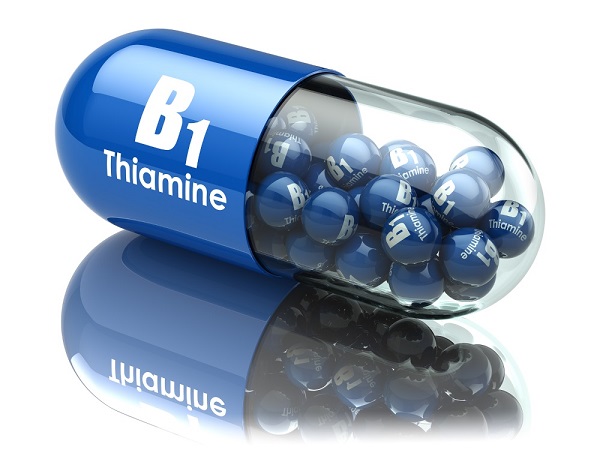COVID-19 Supplements: Vitamin B1 (Thiamine) Could Be An Adjuvant For COVID-19 Treatments To Reduce Inflammation And Help With Neurological Issues
Source: COVID-19 Supplements Aug 29, 2020 5 years, 5 months, 3 weeks, 4 days, 21 hours, 48 minutes ago
COVID-19 Supplements: A new study by researchers from University of Louisville School of Medicine indicate that Vitamin B1 or Thiamine could be used as an adjuvant in COVID-19 treatment protocols as it can help reduce Th17 cell proinflammatory response and also help in various neurological issues that COVID-19 patients might face.

The research findings were published on a preprint server and have yet to be peer-reviewed.
https://www.medrxiv.org/content/10.1101/2020.08.23.20177501v1
Thiamine deficiency has been observed to be common in critically ill patients and has been linked to worse outcomes. Insufficient thiamine levels lead to a shift to anaerobic metabolism and a subsequent rise in serum lactate levels, which in turn, can affect a patient’s acid-base status.
Typically, there are no signs or symptoms specific to thiamine deficiency in critically ill patients, so it often goes unnoticed by physicians. Past studies have shown that thiamine depletion is associated with an almost 50% increase in mortality.
https://pubmed.ncbi.nlm.nih.gov/30373647/ and
https://pubmed.ncbi.nlm.nih.gov/30373647/ and
https://pubmed.ncbi.nlm.nih.gov/21912244/
Although, like many adjuvants, clinical trial data are needed with thiamine, it is proposed that since COVID-19 symptoms cause critical illness, affect multiple organ systems and the inflammatory cascade, and even escalate to acute respiratory distress syndrome, thiamine could prove beneficial in these patients.
It has been shown that the COVID-10 disease can be complicated by a severe exacerbation in the Th17 cell-mediated IL-17 proinflammatory immune storm which plays a major role in mortality and morbidity, including neurological symptoms.
The study team had hypothesized that countering the cytokine storm with thiamine may have therapeutic efficacy in lowering the Th17 cell proinflammatory response.
The team used an in vitro study and corroborated those results in disease controls (DC).
They developed an effective dose range and model for key pharmacokinetic measures with the potential of targeting the cytokine storm and neurological symptoms of COVID-19.
The study team investigated the effect of a three-week 200 mg dose of Vitamin B1 or thiamine in lowering the Th17 response in sixteen DC (proinflammatory origin due to heavy alcohol drinking) patients; and eight healthy control/volunteers (HV) as a pilot clinical-translational investigation.
Also to further investigate, the researchers performed an in vitro study evaluating the effectiveness of thiamine treatment in lowering the Th17 proinflammatory response in a mouse macrophage cell line treated with ethanol. In this in vitro study, 100 mg/day equivalent (0.01 ug/ml) thiamine was used.
The study team then compared the results of the IL-17 response from their clinical and in vitro study to those found in other proinflammatory disease conditions (metabolic conditions, septic shock, viral infectio
ns and COVID-19), including symptoms, and dose ranges of effective and safe administration of thiamine.
They developed a dose range and pharmacokinetic profile for thiamine as a novel intervention strategy in COVID-19 to alleviate the effects of the cytokine storm and neurological symptoms.
Study findings of the DC group showed significantly elevated proinflammatory cytokines compared to HV. Three-week of 200 mg daily thiamine treatment significantly lowered the baseline IL-17 levels while increased IL-22 levels (anti-inflammatory response). This was validated by an in vitro macrophage response using a lower thiamine dose equivalent (100 mg), which resulted in attenuation of IL-17 and elevation of IL-22 at the mRNA level compared to the ethanol-only treated group.
The researchers said that in humans, a range of 79-474 mg daily of thiamine was estimated to be effective and safe as an intervention for the COVID-19 cytokine storm. A literature review showed that several neurological symptoms of COVID-19 (which exist in 45.5% of the severe cases) occur in other viral infections and neuroinflammatory states that may also respond to thiamine treatment.
According to the researchers, the study findings showed that the Th17 mediated IL-17 proinflammatory response can potentially be attenuated by thiamine. Thiamine, a very safe drug even at very high doses, could be repurposed for treating the cytokine/immune storm of COVID-19 and the subsequent neurological symptoms observed in COVID-19 patients. Further studies using thiamine as an interventional/prevention strategy in severe COVID-19 patients could identify its precise anti-inflammatory role.
Another study published in the journal Maturitas, said that thiamine is able to improve immune system function and has been shown to reduce the risk of type-2 diabetes, cardiovascular disease, aging-related disorders, kidney disease, cancer, mental disorders and neurodegenerative disorders. Thiamine deficiency affects the cardiovascular system, causes neuroinflammation, increases inflammation and leads to aberrant antibody responses. As antibodies, and importantly T-cells, are required to eliminate the SARS-CoV-2 virus, thiamine deficiency can potentially result in inadequate antibody responses, and subsequently more severe symptoms.
https://www.maturitas.org/article/S0378-5122(20)30348-0/fulltext
The researchers in that study say that adequate thiamine levels are likely to aid in the proper immune responses during SARS-CoV-2 infection.
In addition, the symptoms of COVID-19 are very similar to altitude sickness and high-altitude pulmonary edema. Acetazolamide is commonly prescribed to prevent high-altitude sickness and pulmonary edema through inhibition of the carbonic anhydrase isoenzymes and subsequently increases oxygen levels. Thiamine also functions as a carbonic anhydrase isoenzyme inhibitor hence, high-doses of thiamine given to people at early stages of COVID-19 could potentially limit hypoxia and decrease hospitalization.
https://www.tandfonline.com/doi/pdf/10.3109/14756366.2011.637200?needAccess=true
Another study published in the journal Modern Care journal by Iranian researchers also did advocate the usage of Vitamin B1 and other B vitamins for COVID-19 patients.
https://sites.kowsarpub.com/mcj/articles/104740.html
Vitamin B1 or thiamine has been used for decades as a supplement and is safe with no side effects and considering numerous past studies that show it can help in immunity, inflammatory and neurological issues, there is very little to loose from incorporating as an adjuvant for COVID-19 treatment protocols.
For more on
COVID-19 Supplements, keep on logging to Thailand Medical Ne
